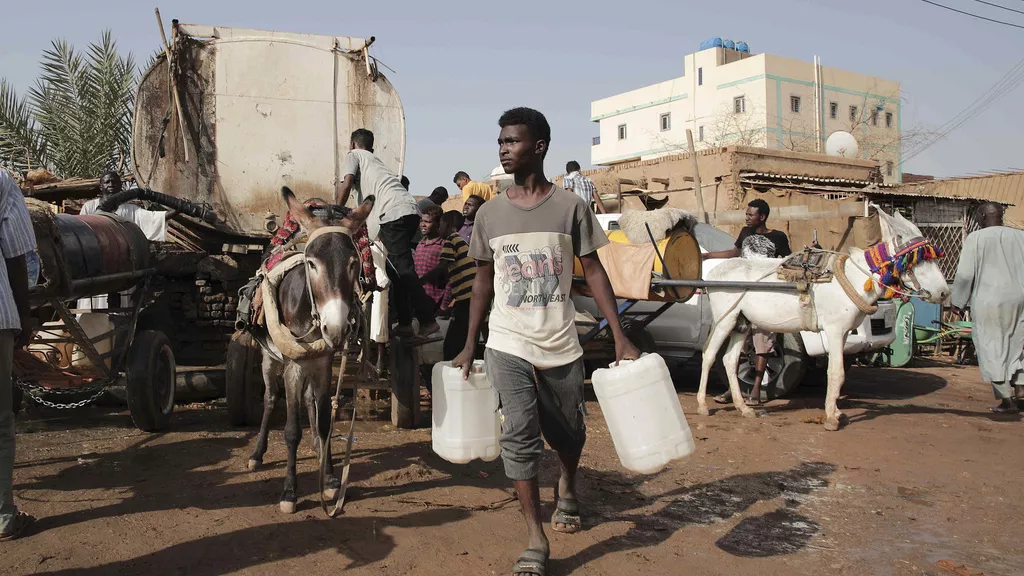UN Official: Allies fueling Sudan’s war are ‘enabling slaughter’
3 min read
FILE - People gather to collect water in Khartoum, Sudan, May 28, 2023.

FILE - People gather to collect water in Khartoum, Sudan, May 28, 2023.
The UN’s political chief, Rosemary DiCarlo, sharply criticized the international community for fueling the devastating war in Sudan, which has resulted in over 24,000 deaths and triggered the worst displacement crisis in the world. Speaking to the UN Security Council on Tuesday, DiCarlo condemned the external support sustaining the violence, stressing that it “must end.”
The conflict in Sudan erupted in April 2023, when long-standing tensions between the Sudanese military and the paramilitary Rapid Support Forces (RSF) turned into all-out warfare. The fighting, which initially began in the capital Khartoum, quickly spread to other regions, including Darfur, where a history of violence and atrocities dates back to 2003. DiCarlo warned that the country was nearing famine, with humanitarian conditions worsening daily.
While she refrained from naming specific countries, DiCarlo accused Sudan’s international backers of enabling the ongoing bloodshed through weapons supply and financial support. “This is unconscionable,” she told the Security Council, adding, “It is illegal, and it must end.”
The UN has consistently condemned the conduct of both warring factions. DiCarlo highlighted the brutal violence by the RSF in Gezira province, where reports from local groups and NGOs revealed atrocities, including killings and the rape of women and girls. “The attacks have been marked by some of the most extreme violence in the last 18 months,” she said. At the same time, the Sudanese Armed Forces (SAF), affiliated with the Sudanese government, have also been accused of perpetrating violent attacks against civilians, particularly in the Khartoum area.
Despite international pleas for a ceasefire, both sides remain entrenched in their belief that victory is possible through military means, and external support has only emboldened them. DiCarlo noted that both sides have continued to escalate their operations and recruit new fighters, with external military support fueling the ongoing violence. The flow of weapons into Sudan has been a key enabler of the conflict, and the end of the rainy season has only seen the violence intensify.
Sudan has accused the United Arab Emirates (UAE) of arming the RSF, a claim that the UAE has denied. The RSF has also reportedly received support from the Russian mercenary group Wagner. Meanwhile, Sudan’s military leader, General Abdel Fattah al-Burhan, is known to have strong ties with Egypt and its president Abdel-Fattah el-Sissi. There are also reports that Sudan’s government has engaged in discussions with Iran, including possible drone purchases.
In response to the escalating crisis, DiCarlo called for a greater international effort to protect civilians and to push for a negotiated peace. The UN’s special envoy to Sudan, Ramtane Lamamra, has been working on facilitating talks, including a new round of “proximity talks,” which aim to focus on commitments to protect civilians and deliver humanitarian aid. However, the Sudanese military boycotted the previous round of talks in Geneva in July, although the RSF participated.
Ramesh Rajasingham, the UN’s coordination director for humanitarian affairs, painted a grim picture of the humanitarian situation. He described the atrocities in Gezira, West Darfur, and North Darfur as “shocking” and said they were driving millions of people from their homes. Since the conflict began in April, more than 11 million Sudanese have been displaced, with 3 million fleeing to neighboring countries. Neighboring Chad has now taken in over 710,000 Sudanese refugees.
The humanitarian crisis continues to deepen, with growing fears of famine. Rajasingham highlighted that El Fasher, the capital of North Darfur, remains one of the few areas not under RSF control, and fighting there has intensified. Hunger experts recently confirmed famine conditions in nearby Zamzam displacement camp, where roughly 34% of children are malnourished, with 10% suffering from severe malnutrition.
In South Kordofan, hunger levels have also reached alarming heights, with food insecurity spreading to other regions. “The situation is incredibly serious,” Rajasingham warned, urging the international community to take urgent action to alleviate the crisis.
As the violence continues and external actors maintain their support for opposing sides, the prospects for peace in Sudan seem uncertain. However, DiCarlo’s call for immediate action reflects the growing global concern about the humanitarian catastrophe unfolding in the country. The need for a concerted international effort to end the conflict and address the underlying causes of violence in Sudan has never been more pressing.